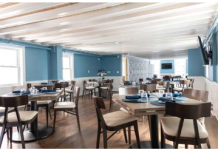By Art Petrosemolo
Dr. Gail Reilly named medical director in changing health care world
This past summer Parker Health Center’s medical director Dr. Roy Carman was leaving his post after six years. The Affordable Care Act was getting ready to go active. Parker needed a new medical director with clinical experience to oversee the Center’s tradition of providing quality care and administrative experience to both navigate the changing face of health care and develop a new center strategy for the future.
It found the right person – Dr. Gail Reilly – closer than expected. The board-certified family physician already was volunteering at Parker and was chosen from the three position finalists as the center’s medical director.
“She has made the change seamlessly ”says Dr. Eugene Cheslock, the center’s founder and board chair. “Dr. Reilly brings to Parker the skills we need at this time,” he continues. “She is passionate not only about the clinical side of our business but how it will have to adjust in the next decade to stay current.”

Reilly who spent 12 years as a military physician including time at Fort Monmouth, is passionate about improving the quality of health care and how it is administered in the 21st century.
Reilly is a published author and sought after conference facilitator. A University of Virginia alumna with undergraduate and medical degrees, she sees Parker Health as a model in providing health care for those who cannot afford it. And she sees the center playing an important role in implementation of the Affordable Care Act commonly called “Obamacare.” She does not look at the Affordable Care Act as a death knell for Parker but a change in the way care is provided to patients along with opportunities for facilities, like Parker, to take an active role in the quickly changing medical scene.
After her military career, Dr. Reilly, during a transition period, started and ran two nonprofits in Freehold and still serves on their boards. One group focused on education and the other on the arts. “It gave me experience working with diverse groups of volunteers all with their own ideas on how we should proceed as well as hands-on fundraising responsibilities,” she says. Both sets of skills help her at Parker.
The center has served those who need health care and can’t afford it or use the emergency room as their only source of health services since 2000. The vision of Cheslock, who continues to serve in a leadership capacity as well as chief fundraiser and largest cheerleader, “Parker has long been thought of as a site for immigrants to receive basic health services. Although we do serve immigrants,” Dr. Cheslock says, “80 percent of our new patients the past few years are American citizens who, during the recession, have lost jobs that provided health care insurance. Without Parker, they would have nowhere to turn other than the emergency room.”
During the past year, Parker had 12,000 patient visits and and with additional space and health care volunteers, could have accommodated more.
The new director is passionate to see that everyone has access to good health care that is affordable. And, she stresses, the third leg is long term improvements in patient health through proper medication, good nutrition and changes in lifestyle that include exercise and stress reduction.
Married and the mother of 16-year old twins (a boy and a girl) and a 12-year old girl, Reilly knows how to multitask which is what she does daily at Parker.

Volunteer doctors, nurses, dentists and health care professionals donate more than 10,000 hours each year to treat Parker’s growing patient base. The 10-year-old facility on Shrewsbury Avenue is fully utilized with examining rooms, offices and space for patient files. The center operates on a $1 million year budget that is not state or federally supported. “We raise our own funds,” Reilly says, “ from grants, individual donations and fundraising activities.” Rocker Jon Bon Jovi has been a longtime financial supporter of the center. Parker Health is a 501(c)3 nonprofit organization. Patients who qualify for care are seen at Parker without charge.
Where does Parker Health, the three other free clinics in the state as well as state and federally supported centers, fit into the new health care model? “We’re not quite sure yet,” both Reilly and Cheslock say. If all goes as planned and everyone in the country has health care, the doctors say, Parker and its counterparts could be acquired by large regional health care entities or become hybrids seeing uninsured and Medicaid patients.
“But I don’t think either of those scenarios or any other will happen in the immediate future,” Cheslock speculates. “There always will be people who for one reason or another just aren’t covered under the new health care act and will need health care other than an emergency room visit. That’s where we fit in for now. The Congressional budget office projects 30 million uninsured in 2022.”
Parker’s goal always has been to provide initial health care as needed and long-term health management for patients so that the emergency room is not their only option for care. On average, the cost of treating a patient at Parker is under $90 per patient visit while the services at a hospital emergency room – that these patients cannot pay – is $1,300.”
Reilly, in the short period she has served as medical director, has begun to put her mark on the operation. She is personable, knowledgeable, patient-friendly and works easily with the staff and health care volunteers. She might be called “the right person at the right time for Parker,” says Cheslock.
Although Parker offers medical, social services and legal help, as needed, to patients, to enhance their long-term well-being, Reilly wants to do more. “We need to attract more medical volunteers,” she says, “either physicians in private practice who can give us a few hours a week to retired doctors who want to stay current and active, as well as nurses, nurse practitioners, physicians assistants and social workers. We welcome them all.”
Reilly truly believes that centers like Parker are one of the future tracks of health care where treating large numbers of patients at low per patient costs, within the Affordable Care Act, is not only possible but imperative. She welcomes the challenge of guiding Parker Health through the emerging health care maze while continuing to serve the community as the center has done and done well for the past 13 years.














